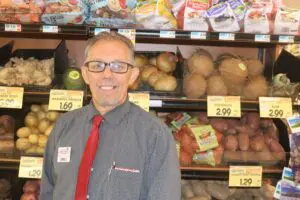Cold Spring supermarket now ‘employee-owned’
Positive outcomes were not the hallmark of the COVID-19 pandemic, but its aftermath did produce a silver lining for employees of the Foodtown supermarket in Cold Spring. They now own their company.
Many of the Cold Spring grocery’s employees worked through the pandemic, drawing praise from residents for the service they provided during what was an uncertain and anxiety-filled time. In 2021, the company converted its stores to “employee-owned” by adopting an employee stock ownership program (ESOP).
“We realized we had to do it when we saw the job our associates did during COVID,” said Noah Katz, the president and CEO of PSK Supermarkets.

PSK owns 14 supermarkets in Nassau County, Long Island, New York City and as far north as Columbia County. Including in Cold Spring, 10 operate under the Foodtown banner while four are branded as Freshtown or Pathmark stores.
The chain employs close to 1,000 workers, including about 40 in Cold Spring, Katz said, adding that, unlike payroll-deduction plans, Foodtown employees pay nothing to participate in the ESOP. Full- and part-time workers and managers become eligible for the program after working at Foodtown for a year.
Each year, the company announces its share price and allocates stock to eligible employees. Employees’ allocations are based on their earnings.
Employees are 20 percent vested after a year in the program, which means they collect 20 percent of the value of their shares if they leave Foodtown. Vesting increases to 40 percent after three years and 60 percent after five. After six years employees are fully vested.
“But our goal is not for people to leave,” Katz said. “We want them to stay with us until they retire.”
Mike Wilson, the general manager of the Cold Spring grocery, worked for its predecessor, Grand Union, for five years before it was destroyed by fire in early 2002. Foodtown opened at the same site in April 2003.
“I’m excited about the ESOP; it will really help with retirement,” he said. “Getting the stock also makes us more entrepreneurial, more invested in our future and in making the company better.”
“One thing I’ve always appreciated about working for Foodtown is they were family-oriented from the beginning,” Wilson said. “ESOP is just another layer of that, trying to make us feel a part of their family.”

Katz said the company also benefits from employee ownership. “It gives everyone a stake in the company,” he said. “It gives people something to work toward and helps reduce turnover.”
Initiating the program also made economic sense in the wake of the COVID-driven recession. Nationally, the number of employee ownership programs had declined prior to the pandemic, though it has increased since.
The National Center for Employee Ownership estimated that in 2023 more than 6,300 U.S. companies had ESOPs, with 14.7 million participants holding more than $2.1 trillion in assets.
According to Douglas Kruse, a Rutgers University economist, ESOP companies tend to be more stable financially, lay off fewer employees and have higher survival rates, especially during recessions. While the program is beneficial for employees, it is not tax-free.
ESOP distributions are taxed as ordinary income and if participants sell shares they may owe capital gains tax on any increase in the stock’s value.


Foodtown supports local organizations, offers excellent customer service and its bakery cupcakes are birthday party perfection. [via Instagram]
Congratulations to the Foodtown employees. They did a great job during the pandemic and a shoutout to manager Mike Wilson, who never stops working. [via Facebook]
We’re halfway between Foodtown and bigger stores in Fishkill, but we always go to Foodtown because of the amazing folks there. [via Instagram]